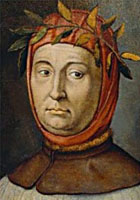Francesco Petrarch
Francesco Petrarch Poems
I go weeping for my time past,
that I spent in loving something mortal,
without lifting myself in flight, for I had wings
...
Diana was never more pleasing to her lover,
when, by a stroke of fate, he saw her naked,
shown in the deep pool of icy water,
than I was by the mountain shepherdess,
...
Being one day at my window all alone,
So manie strange things happened me to see,
As much as it grieveth me to thinke thereon.
At my right hand a hynde appear'd to mee,
...
I have not seen you, lady,
leave off your veil in sun or shadow,
since you knew that great desire in myself
...
I find no peace, and yet I make no war:
and fear, and hope: and burn, and I am ice:
and fly above the sky, and fall to earth,
...
O my own Italy! though words are vain
The mortal wounds to close,
Unnumber'd, that thy beauteous bosom stain,
...
Many times now, with my true thought,
I've dared to assail my enemy, quiet and humble
in her actions, her beauty seeming kind,
...
If no love is, O God, what fele I so?
And if love is, what thing and which is he?
If love be good, from whennes cometh my woo?
If it be wikke, a wonder thynketh me,
...
Zephyr returns and brings fair weather,
and the flowers and herbs, his sweet family,
and Procne singing and Philomela weeping,
...
What infinite providence and art
He showed in his wonderful mastery,
who created this and the other hemisphere,
...
What do I feel if this is not love?
But if it is love, God, what thing is this?
If good, why this effect: bitter, mortal?
...
Ah me, the beautiful face, ah me, the gentle look,
ah me, the graceful noble manner of her:
ah me, the speech that made every harsh
...
The high column and the green laurel are broken
that cast a shade for my weary thoughts:
I have lost what I do not hope to find again
...
Life flies, and never stays an hour,
and death comes on behind with its dark day,
and present things and past things
...
The eyes I spoke about so warmly,
and the arms, the hands, the ankles, and the face
that left me so divided from myself,
...
When I turn again to gaze on the years
that have scattered all my thoughts in passing,
...
Where is the forehead, that could make my heart turn
this way and that, with the slightest gesture?
Where are the beautiful lashes and the two stars
...
My thought raised me to a place in which
she was whom I seek, and cannot find on earth:
there, among those who are in the third circle,
...
Through the midst of inhospitable, wild woods,
where men at arms go at great risk,
I go safely, since nothing can frighten me
...
A pure white hind appeared to me
with two gold horns, on green grass,
between two streams, in a laurel's shade,
...
Francesco Petrarch Biography
Francesco Petrarca (Italian pronunciation: [franˈtʃesko peˈtrarka]; July 20, 1304 – July 19, 1374), commonly anglicized as Petrarch (/ˈpiːtrɑːrk, ˈpɛtrɑːrk/), was an Italian scholar and poet in Renaissance Italy, and one of the earliest humanists. Petrarch's rediscovery of Cicero's letters is often credited for initiating the 14th-century Renaissance. Petrarch is often called the "Father of Humanism". In the 16th century, Pietro Bembo created the model for the modern Italian language based on Petrarch's works, as well as those of Giovanni Boccaccio, and, to a lesser extent, Dante Alighieri. Petrarch would be later endorsed as a model for Italian style by the Accademia della Crusca. Petrarch's sonnets were admired and imitated throughout Europe during the Renaissance and became a model for lyrical poetry. He is also known for being the first to develop the concept of the "Dark Ages." This standing back from his time was possible because he straddled two worlds - the classical and his own modern day.)
The Best Poem Of Francesco Petrarch
I go weeping for my time past,
‘I'vo piagendo i miei passati tempi'
I go weeping for my time past,
that I spent in loving something mortal,
without lifting myself in flight, for I had wings
that might have freed me for spaces not so low.
You who see my shameful and impious sins,
King of Heaven, invisible, immortal,
help this frail and straying soul,
and mend its defects through your grace:
So that, if I have lived in war and tempest,
I may die in peaceful harbour: and if my stay
was vain, let my vanishing, at least, be virtuous.
Deign that your hand might rest on that little life
that is left to me, and on my death:
You truly know I have no other hope.
Translated by: A. S. Kline
Francesco Petrarch Comments
and the original text of Petrarch's sonnet CCCX: Zephiro torna, e ’l bel tempo rimena, e i fiori et l’erbe, sua dolce famiglia, et garrir Progne et pianger Philomena, et primavera candida et vermiglia. Ridono i prati, e ’l ciel si rasserena; Giove s’allegra di mirar sua figlia; l’aria et l’acqua et la terra è d’amor piena; ogni animal d’amar si riconsiglia. Ma per me, lasso, tornano i piú gravi sospiri, che del cor profondo tragge quella ch’al ciel se ne portò le chiavi; et cantar augelletti, et fiorir piagge, e ’n belle donne honeste atti soavi sono un deserto, et fere aspre et selvagge.

hey guys check this guy out